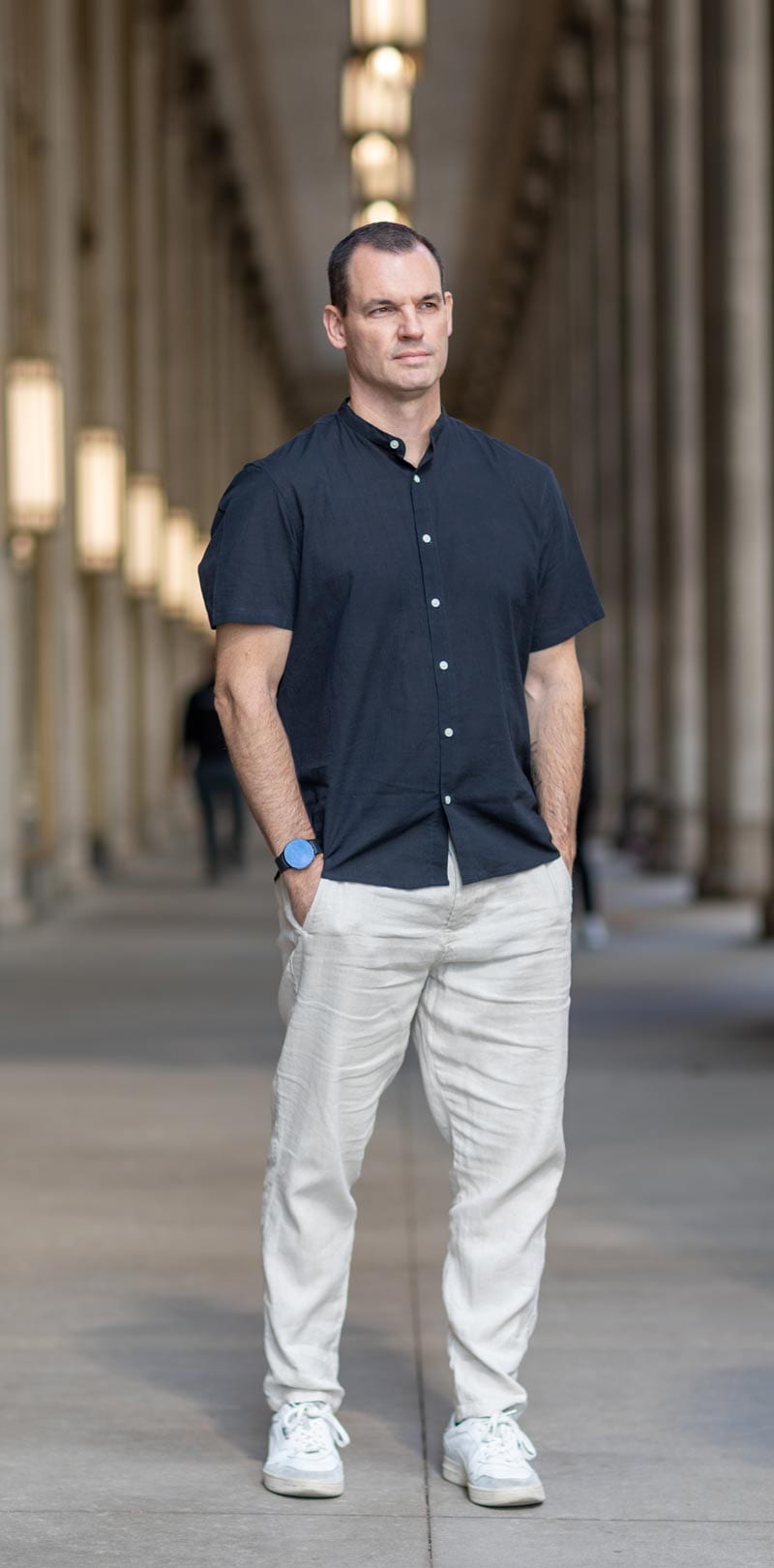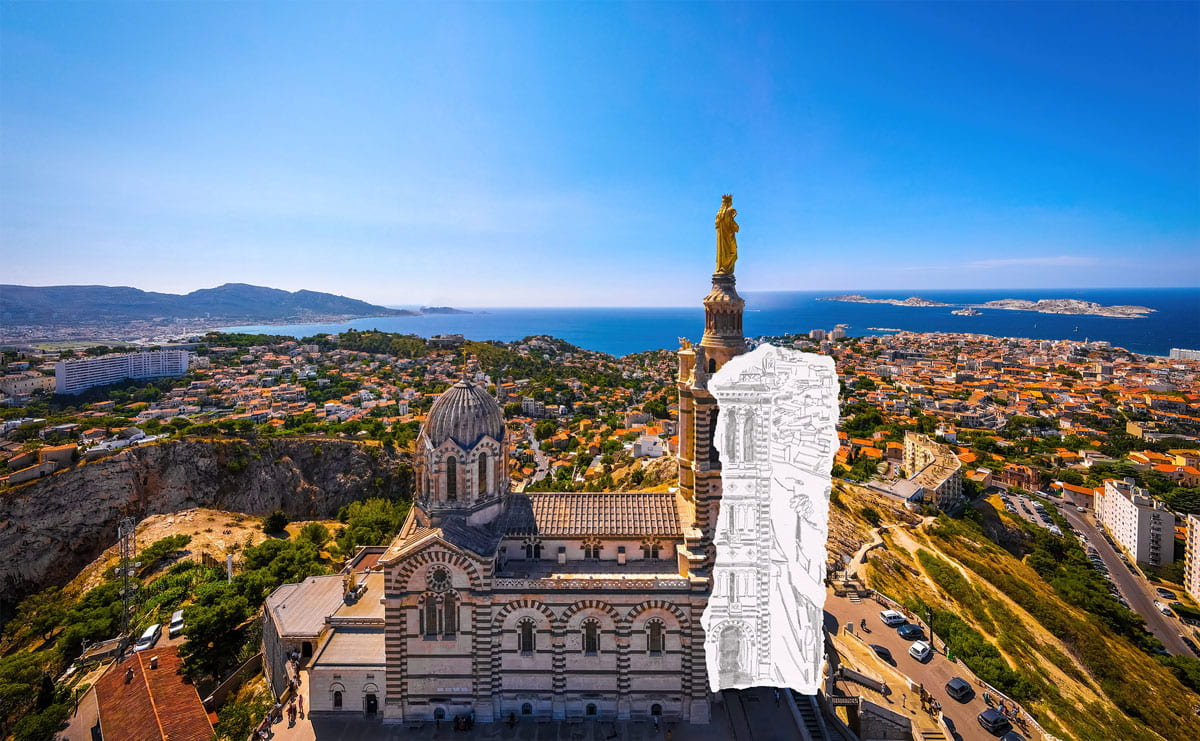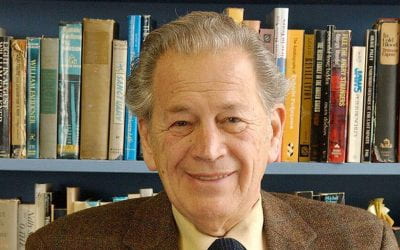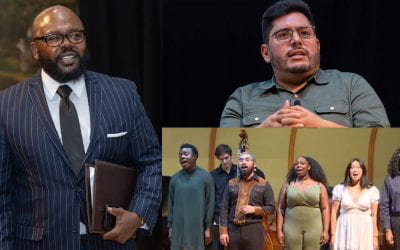unexcused absence
By the time our TGV train from Paris Gare de Lyon rolled into Marseille’s Saint-Charles station in early July 2023, there were no signs of protests or police in riot gear. In fact, my family’s first moments in Marseille were spent outside the train station soaking in the sun and perfectly clear blue sky. We could smell the sea as we snapped photos of Notre-Dame de la Garde Basilica perched high above the city off in the distance.
It was an interesting moment. I scanned the city for the first time and took in this spectacular panorama—so much beauty. Yet the closer we looked, the clearer the picture became.
As we walked through Le Vieux Port near our hotel, I didn’t understand this spray-painted message on boarded-up shops, banks and restaurants:
Nique la police.
“What does that mean,” I finally asked my wife, the French speaker in our relationship.
“It’s ‘fuck the police.’” (Hopefully our seven-year-old son was not paying attention to that part of our conversation.)
Our son heard us discussing the graffiti and broken windows, and he wanted an explanation.
“Well, the police in Paris did something bad,” we told him.
“Don’t the police help people?”
Clearly there was some confusion, and an additional explanation was needed.
“Yes, they’re supposed to…but sometimes, unfortunately, they don’t.”
Rewind to the days leading up to our arrival in Marseille when the port city’s streets were overtaken by protestors clashing with police in riot gear. The standoff was fueled by the June 27 shooting and death of a 17-year-old boy of Algerian and Moroccan descent in Nanterre, France—a Parisian suburb that just happens to be where my wife grew up and where her mother still has an apartment.
The shooting occurred during a traffic stop, leading to demonstrations and protests throughout France. Once again, a tragedy brought to light that the City of Lights with its cozy cafés, Michelin restaurants and high-end shopping districts do not tell the whole story. Close to where tourists shop the Champs-Élysées and pose for photos in front of the Arc de Triomphe, there are the Parisian suburbs, or banlieues, where poverty, discrimination and inequality paint an ugly picture of a Paris most of the world has never seen.
What goes on in the banlieues of Paris is something we want to continue teaching our son about. It is also a place I want to continue learning about since it helps me better understand who my wife is today. She spent much of her childhood growing up in and escaping the banlieues, and the experience spurred her to pursue psychology as a career to empower others.
According to a 2015 New Yorker article, “banlieue has become pejorative, meaning slums dominated by immigrants.” My wife and her mother arrived in Paris as immigrants from Poland in the early 1980s. They spent their first six years in France with no proper place to call home. They were taken in by Polish nuns, and my wife even attended boarding school before finding their own small piece of Paris in a one-bedroom apartment. The apartment was in one of Nanterre’s many towering concrete housing projects built between 1973 and 1982. In fact, it was in the same Pablo-Picasso housing estate, or Cité Pablo Picasso, where the 17-year-old boy who was killed by police in Nanterre in June 2023 was raised.
Despite its obvious flaws, there was some appeal to Nanterre when my wife and her mother arrived in the mid-1980s. The parks and playgrounds helped bring laughs and life to the neighborhood, and their building’s round and tear-drop shaped windows were cool accents. However, there were serious, everyday struggles that came with living in the banlieue. My wife routinely witnessed drug deals go down in front of her home. She was sexually harassed on her way to and from school as she walked through Parc André Malraux. Her school was once tagged up so heavily that it closed for days just to remove the graffiti.
For someone who grew up so differently, hearing these stories for the first time was shocking. Seeing these places with my own eyes made the stories even more real, and my travels to Nanterre have been an education. Not only do I better understand who my wife is today, but I also recognize the inequalities immigrants face in education, employment and housing. It is a difficult cycle for families to break.
My experience growing up in a very white Chicago suburb was far different. Basically, my entire existence was the street where I lived, a few neighborhood parks and my school. There was no worry or discussion about drugs. There were no gangs or people bothering me and my friends as we rode our bikes and played sports in my backyard. And school was always a safe place.
While I am thankful for all of that, I do not take pride in the self-centeredness and lack of empathy that can come when you live in a sheltered environment like I did for so many years. Growing up, I cannot remember contemplating what life was like for people outside our neighborhood or taking the time to appreciate all the privileges we enjoyed. Looking back, I think a big reason those conversations failed to take place is because we did not spend much time outside our small, isolated world. My parents didn’t have the desire or financial means to travel anywhere—not even the hour drive into Chicago.
I lived in this safe little suburban bubble, insulated from the real world. It wasn’t until my first year out of high school when I started taking classes at Roosevelt’s downtown campus that my world started to open up. But even then, I always found my way back to the safety of the suburbs.

MATTHEW BEARDMORE
When I attended Roosevelt for the first time shortly after graduating high school, it was the first time I had spent a significant amount of time in Chicago and around those who did not look like me. My commute to Roosevelt’s downtown campus was eye-opening as each day I stepped out of Union Station and into the middle of one of the world’s great cities made up of people from so many different backgrounds and cultures.
One of the highlights of Roosevelt Education was my time working on the school newspaper, The Torch. We were a diverse group of students who collaborated well and produced a solid publication. It was during this time that I not only learned that I wanted to pursue a career in journalism, but that I could work well with those who had different beliefs and backgrounds. It was an invaluable part of my Roosevelt education.
After graduation, I was living in another suburb with two of the guys I grew up with when I met my wife at a bar in Chicago’s Gold Coast. Soon after we started dating, I balked at an invitation she presented me with:
“Wait, you want me to go to Paris with you?”
“You mean, Paris in France?”
“I don’t have a passport.”
“I can’t even speak the language.”
I had plenty of reasons why I could not or should not go, but they were all just excuses so I wouldn’t leave my comfort zone. But when I finally secured a passport and took that first trip to France with my future wife, my life changed forever. Laying eyes on the Eiffel Tower and the Louvre, eating my first jambon-beurre, hearing the mopeds zip through traffic along the Champs-Élysées and feeling the energy of the world’s most visited city helped me start to understand how blind I had been by not expanding my lens.
As my physical world has continued to grow over the years, so has my worldview. Seeing first-hand how others live and what they value has been life-changing. In France, people fiercely value their time away from work and they get plenty of it. It is quite different from the workaholic culture that many of us have been sucked into here in the United States, where people are often afraid to take time off work or feel obligated to check email even when they are out sick. Travel has forced me to reassess how I think about work, family, politics, injustice and many other issues. I am no longer tied to the beliefs of where I grew up.
As much as I appreciate the relative physical safety of my childhood, along with the friendships I forged that still exist today 30+ years later, I was not done any favors by growing up in a sterile and close-minded environment without diversity.
Neither my wife nor I want that for our son. We want our son to become a citizen of the world—not just our community or city. We want him to interact with people who are from different cultures, who speak different languages and who own different beliefs. Our hope is that by showing our son all the wonderful differences this world has to offer, he will begin to understand how and where he fits into the bigger picture.

While there has been debate about whether travel can open people’s minds and help them become more empathetic, a 2017 article by Harvard Medical School psychiatrist Helen Riess called “The Science of Empathy” says that “Our capacity to perceive and resonate with others’ suffering allows us to feel and understand their pain. The personal distress experienced by observing others’ pain often motivates us to respond with compassion.”
However, just being an observer and having compassion in your heart is simply not enough. We want our son to understand that the opportunities and privilege he enjoys come with a responsibility to initiate positive change and empower those who live in forgotten places and those who do not understand what privilege feels like.
Travel is therefore a critical part of his education. My wife and I value formal education as much as anyone, but since we believe some of life’s most important lessons cannot be taught inside the four walls of a classroom, we no longer worry so much about him receiving an “unexcused absence” from school due to our travel plans.
Our hope is that by showing our son the world and educating him about the beauty and flaws of where our travels take us, not only will his views be shaped by all the wonderful diversity this world has to offer, he will understand his responsibility to try to make positive changes for those who are not in position to do so.

More in this section
Our Ted Talk: Remembering President Emeritus Theodore Gross
Ted Gross was a great leader. A man with transforming ideas, which he enthusiastically shared. He had great expectations for us. Above all, his legacy was defined by hope.
The City and The American Dream
Cities have served as key sites of economic innovation and growth, cultural self-expression, and central American ideas, such as the melting pot. This makes the city an ideal lens through which to think about the American dream, especially at Roosevelt University in the heart of Chicago.
President’s Perspective
The work of building a better society is never done, and Chicago is the perfect place to try to make social justice a cornerstone of the world in which we live.



